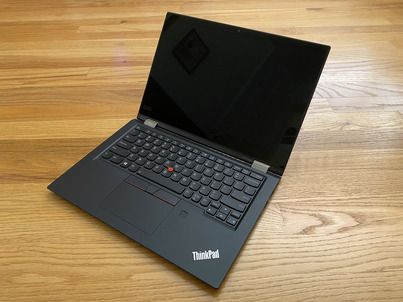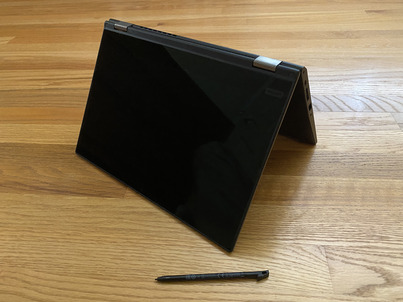ThinkPad L13 Yoga Running Arch Linux Mini Review

The Lenovo ThinkPad L13 Yoga is a remarkable and quite popular little machine that is still being offered by multiple vendors. This post is all about my ownership experiences about a year after purchase and how I've installed a rock-solid and trouble-free Linux distribution on it.
1. Hardware
For the asking price (now well under $800), this light and portable convertible ThinkPad provides more than adequate performance in its class - even after over year since release. Let's have a quick look at the specifications:
- 13.3" Full HD 10-point multitouch screen
- 10th Gen Intel Core i5-10210U mobile processor
- 8GB system memory for advanced multitasking
- 256GB solid state drive (SSD)
- 360° flip-and-fold design
- 3.15 lbs. and 0.7" thin
While the Comet Lake Core i5 processor is entry-level the notebook also includes a Wacom pen which is stored in a very convenient built-in charging storage slot. Along for the ride is a fantastic backlit keyboard right in line with what one would expect from Lenovo's ThinkPad series of portables - consistent feel across all keys with a satisfying response. Unfortunately, the patented "lift-lock" system to retract the keyboard keys into the chassis in tablet mode (where the screen is folded all the way back) is missing in action, but that's an understandible sacrifice to keep the manufacturing costs down. To address enterprise needs Lenovo added a biometric fingerprint reader made by Goodix. It works well enough on the pre-loaded Windows 10 Home image, but Goodix' support for Linux is lacking here, and is the single blemish that I could find while getting Arch Linux installed.

2. Software
One of the ways Lenovo keeps the price reasonable on this entry-level ThinkPad (and still can keep calling it a ThinkPad!) is the default Windows 10 Home edition - which would need to be upgraded to at least the Pro version for deployments in the enterprise. SCCM packages are provided and regularly updated to track with the latest Windows releases on Lenovo's support site: https://pcsupport.lenovo.com/us/en/products/laptops-and-netbooks/thinkpad-l-series-laptops/thinkpad-l13-yoga-type-20r5-20r6/downloads/driver-list/component?name=Enterprise%20Management
ThinkPads are traditionally business-oriented notebooks so there's nothing too surprising on that front.
What has been a rather pleasant surprise (for me at least) remains how Linux-friendly the L13 Yoga is, if you can do without the fingerprint biometric functionality. Touch, pen, auto screen rotation and power management (idle power consumption of around 4-5W is attainable without too much work) are fully supported by mainline Linux kernels released since around 2018.
3. Arch Linux installation with BTRFS, Timeshift, Hibernation, KVM Virtualization and the Cinnamon Desktop Environment
Arch is, of course, a rolling release distribution that requires some thought to keep things working reliably from a system administration perspective. In this case we'll stay pretty conseravative and stick to the LTS kernel, BTRFS and Timeshift for quick and relatively painless rollbacks, a separate swap partition large enough to store the RAM hibernation image, and a desktop environment that is actively being developed with low "churn." The following is taken directly from my installation notes, the ever-awesome Arch Wiki as well as other online sources and it should be fairly straightforward to convert to a script if the need arises.
You can download the latest ISO image from https://archlinux.org/download/ and write it to a USB key following the Arch Wiki. I've found that both the 'dd' shell command and balenaEtcher https://www.balena.io/etcher/ work equally well on my OS installation thumb drive collection.
In the BIOS setup turn off Secure Boot - Arch does not support it yet. Make sure Virtualization is turned on while you are in there if you want KVM to work properly. Then, boot from the thumb drive you just imaged and follow the installation steps (they assume the reader has some familiarity with installing Linux - this is Arch btw!). They work great for me, however I recommend that you carefully study the wonderful Arch Wiki https://wiki.archlinux.org/ to help understand what's happening at each step and of course YMMV with no guarantees whatsoever are given.
Installation
1Set $HOSTNAME and $USERNAME to the values you want
2
3timedatectl set-ntp true
4
5reflector --country US --age 6 --protocol https --latest 5 --sort rate --save /etc/pacman.d/mirrorlist
6
7pacman -Syy
8
9gdisk /dev/nvme0n1
10
11Create a new GPT partition table and walk through the partitioning as follows:
12/boot/efi /dev/nvme0n1p1 EFI System Partition FAT32 500 MiB
13[SWAP] /dev/nvme0n1p2 Linux swap SWAP RAM + 1GB for hibernation
14/ /dev/nvme0n1p3 Linux BTRFS whatever space is left
15
16mkfs.fat -F32 /dev/nvme0n1p1
17
18mkswap /dev/nvme0n1p2
19
20swapon /dev/nvme0n1p2
21
22mkfs.btrfs -L arch /dev/nvme0n1p3
23
24mount /dev/nvme0n1p3 /mnt
25
26cd /mnt
27
28btrfs subvolume create @
29btrfs subvolume create @home
30
31cd ..
32umount /mnt
33
34mount -o noatime,compress=zstd,space_cache=v2,discard=async,subvol=@ /dev/nvme0n1p3 /mnt
35
36mkdir -p /mnt/boot/efi
37mkdir /mnt/home
38
39mount /dev/nvme0n1p1 /mnt/boot/efi
40mount -o noatime,compress=zstd,space_cache=v2,discard=async,subvol=@home /dev/nvme0n1p3 /mnt/home
41
42pacstrap /mnt base base-devel linux-lts linux-firmware sysfsutils e2fsprogs efibootmgr dosfstools mtools mkinitcpio dhcpcd inetutils netctl grub os-prober device-mapper cryptsetup gptfdisk nano nvme-cli less lvm2 dialog reflector vim zsh grml-zsh-config neofetch
43
44pacstrap /mnt xorg xorg-apps xorg-server xorg-drivers xorg-xkill xorg-xinit xterm mesa
45
46pacstrap /mnt linux-lts-headers arch-install-scripts bind-tools intel-ucode dkms p7zip archiso mkinitcpio-archiso plocate haveged pacman-contrib pkgfile git diffutils usbutils jfsutils reiserfsprogs btrfs-progs f2fs-tools logrotate man-db man-pages mdadm perl s-nail texinfo which dvd+rw-tools udftools xfsprogs lsscsi sdparm sg3_utils smartmontools fuse2 fuse3 ntfs-3g exfatprogs gvfs gvfs-afc gvfs-goa gvfs-gphoto2 gvfs-mtp gvfs-nfs gvfs-smb unrar unzip unace xz xdg-user-dirs grsync ddrescue dd_rescue testdisk hdparm htop rsync hardinfo bash-completion lsb-release polkit bleachbit packagekit gparted papirus-icon-theme meld libburn libisofs libisoburn devtools
47
48arch-chroot /mnt systemctl enable haveged.service
49
50pacstrap -i /mnt virt-manager qemu qemu-arch-extra edk2-ovmf bridge-utils dnsmasq vde2 iptables-nft ebtables openbsd-netcat
51
52arch-chroot /mnt systemctl enable libvirtd.service
53
54pacstrap /mnt pulseaudio celluloid vlc cdrtools gstreamer gst-libav gst-plugins-base gst-plugins-good gst-plugins-bad gst-plugins-ugly gstreamer-vaapi xvidcore frei0r-plugins cdrdao dvdauthor transcode alsa-utils alsa-plugins alsa-firmware pulseaudio-alsa pulseaudio-equalizer pulseaudio-jack ffmpeg ffmpegthumbnailer libdvdcss gimp guvcview imagemagick flac faad2 faac mjpegtools x265 x264 lame sox mencoder
55
56pacstrap /mnt b43-fwcutter broadcom-wl-dkms ipw2100-fw ipw2200-fw net-tools networkmanager networkmanager-openvpn nm-connection-editor network-manager-applet wget curl firefox thunderbird wireless_tools nfs-utils nilfs-utils dhclient dnsmasq dmraid dnsutils openvpn openssh openssl samba whois iwd filezilla avahi openresolv youtube-dl vsftpd wpa_supplicant
57
58arch-chroot /mnt systemctl enable NetworkManager.service
59arch-chroot /mnt systemctl enable avahi-daemon.service
60arch-chroot /mnt systemctl enable avahi-dnsconfd.service
61arch-chroot /mnt systemctl enable sshd.service
62
63pacstrap /mnt ttf-ubuntu-font-family ttf-dejavu ttf-bitstream-vera ttf-liberation noto-fonts ttf-roboto ttf-opensans opendesktop-fonts cantarell-fonts freetype2 ttf-hack terminus-font
64
65pacstrap /mnt system-config-printer foomatic-db foomatic-db-engine gutenprint hplip simple-scan cups cups-pdf cups-filters cups-pk-helper ghostscript gsfonts python-pillow python-pyqt5 python-pip python-reportlab
66
67arch-chroot /mnt systemctl enable cups.service
68
69pacstrap /mnt cinnamon cinnamon-translations gnome-terminal adwaita-icon-theme adapta-gtk-theme arc-gtk-theme arc-icon-theme gtk-engine-murrine gnome-keyring nemo nemo-share xed file-roller nemo-fileroller tmux tldr transmission-gtk brasero asunder quodlibet gnome-disk-utility polkit-gnome gnome-packagekit evince viewnior lightdm lightdm-gtk-greeter lightdm-gtk-greeter-settings accountsservice dconf-editor metacity
70
71arch-chroot /mnt systemctl enable lightdm.service
72
73genfstab -U /mnt >> /mnt/etc/fstab
74arch-chroot /mnt
75
76optionally remove any subvolids, and extra subvol= in /etc/fstab and review sane status
77
78ln -sf /usr/share/zoneinfo/America/Los_Angeles /etc/localtime
79hwclock --systohc
80
81nano /etc/locale.gen
82 uncomment en_US.UTF-8 and save
83
84locale-gen
85
86nano /etc/locale.conf
87 LANG=en_US.UTF-8
88
89nano /etc/hostname
90
91nano /etc/hosts
92 127.0.0.1 localhost
93 ::1 localhost
94 127.0.1.1 $HOSTNAME.localdomain $HOSTNAME
95
96passwd
97
98nano /etc/mkinitcpio.conf
99 MODULES=(i915 btrfs)
100 remove fsck from HOOKS line and add btrfs resume
101
102mkinitcpio -p linux-lts
103
104grub-install --target=x86_64-efi --efi-directory=/boot/efi --bootloader-id=ArchLinux
105
106grub-mkconfig -o /boot/grub/grub.cfg (check /etc/fstab for swap UUID to add resume partition to default kernel param in /etc/default/grub, for example:
107GRUB_CMDLINE_LINUX_DEFAULT="loglevel=3 quiet resume=UUID=51f170b4-c5d3-4489-a862-e4a8857df30b"
108)
109
110pacman -S blueberry (not needed for KDE or Gnome)
111systemctl enable bluetooth
112
113nano /etc/bluetooth/main.conf
114 under [Policy] AutoEnable=true
115
116useradd -mU -s /bin/zsh -G sys,log,network,floppy,scanner,power,rfkill,users,video,storage,optical,lp,audio,wheel,adm,libvirt $USERNAME
117
118passwd $USERNAME
119
120EDITOR=nano visudo
121 uncomment %wheel ALL=(ALL) ALL
122
123nano /etc/lightdm/lightdm.conf
124 under [LightDM] logind-check-graphical=true
125
126nano /etc/systemd/logind.conf
127 HandleLidSwitch=suspend-then-hibernate
128 HandleLidSwitchExternalPower=ignore
129
130nano /etc/systemd/sleep.conf
131 HibernateDelaySec=20min
132
133systemctl enable fstrim.timer
134
135cd /etc/xdg/reflector
136mv reflector.conf reflector.conf.orig
137nano reflector.conf
138--country US
139--age 6
140--protocol https
141--latest 5
142--sort rate
143--save /etc/pacman.d/mirrorlist
144
145systemctl enable reflector.timer
146systemctl enable reflector.service
147
148exit
149umount -a
150reboot
151
152***Log in to your new system***
153
154git clone https://aur.archlinux.org/yay
155cd yay
156makepkg -si PKGBUILD
157cd ..
158rm -fr yay
159
160yay -S timeshift timeshift-autosnap
161
162launch TS and configure (all defaults for btrfs are fine to start with)
163
164Let's make sure we have a local backup copy of the boot partition for every kernel upgrade:
165sudo mkdir /etc/pacman.d/hooks
166sudo nano /etc/pacman.d/hooks/50-bootbackup.hook
167
168 [Trigger]
169 Operation = Upgrade
170 Operation = Install
171 Operation = Remove
172 Type = Path
173 Target = usr/lib/modules/*/vmlinuz
174
175 [Action]
176 Depends = rsync
177 Description = Backing up /boot...
178 When = PreTransaction
179 Exec = /usr/bin/rsync -a --delete /boot /boot-backup
180
181yay -Syy
182yay -S pamac
183
184launch pamac and *uninstall* xf86-video-intel (Cinnamon and KDE) and xf86-input-synaptics
185install libva-utils and intel-media-driver for video encoding/decoding acceleration
186
187yay -S ttf-cascadia-code ttf-comic-mono-git ttf-ms-fonts gufw tlpui
188
189Thinkpad specific:
190sudo systemctl enable --now tlp.service
191sudo pacman -S acpi_call-dkms xf86-input-wacom
192sudo pacman -S iio-sensor-proxy (even Gnome needs this one!)
193yay -S screenrotator-git (for KDE, XFCE, Cinnamon etc, not Gnome)
194Go to Display settings and enable screen rotation in Cinnamon
195
196su -
197ufw default deny
198ufw allow from 10.1.10.0/24 (modify to suit your local network)
199ufw allow Transmission
200ufw limit ssh
201ufw enable
202
203All done!
204